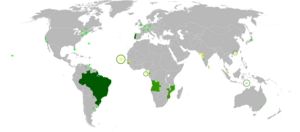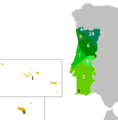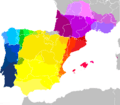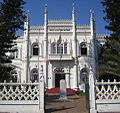Portuguese language facts for kids
Quick facts for kids Portuguese |
||||
|---|---|---|---|---|
| português | ||||
| Pronunciation | ||||
| Native to | Portugal | |||
| Native speakers | 215 million (2010) | |||
| Language family | ||||
| Early forms: |
Medieval Galician
|
|||
| Writing system | Latin (Portuguese alphabet) Portuguese Braille |
|||
| Official status | ||||
| Official language in |
9 countries
Many international organisations |
|||
| Regulated by | International Portuguese Language Institute Academia Brasileira de Letras (Brazil) Academia das Ciências de Lisboa, Classe de Letras (Portugal) CPLP |
|||
| Linguasphere | 51-AAA-a | |||

Native language
Official and administrative language Cultural or secondary language Portuguese speaking minorities Portuguese-based creole languages |
||||
|
||||
Portuguese (called português in Portuguese) is a fascinating Romance language. It grew from an older language called Galician-Portuguese. This language was first spoken in the northwest part of the Iberian Peninsula (which is where Spain and Portugal are today). Over time, it spread south and changed into the Portuguese we know. During the colonial era, Portuguese traveled across the world. It was brought to Brazil and many other places.
Contents
Where Portuguese is Spoken
The Portuguese language is very popular around the world. It is the third most spoken Western language, after English and Spanish. About 240 million people speak Portuguese as their first language.
- Countries where Portuguese is the main language:
* Portugal * Brazil * Cape Verde (Cabo Verde)
- Countries where Portuguese is an official language:
* Guinea-Bissau * Angola * Mozambique (Moçambique) * São Tomé and Príncipe (São Tomé e Príncipe) * East Timor * Macau (a special region of China)
In some of these countries, like Angola or Mozambique, Portuguese is a lingua franca. This means it's a common language used by people who speak different native languages.
You can also find Portuguese speakers in other parts of the world. There are communities in Asia, like in Goa and Daman and Diu in India. Also in Flores, Indonesia, and Malacca, Malaysia. Smaller groups of Portuguese speakers live in Venezuela, Canada, Uruguay, Namibia, and the United States.
Portuguese Words and English
Portuguese and English share many words. These words often look or sound similar and have the same meaning. This is because both languages got many words from Latin, Greek, or French.
- Visão means "Vision"
- Informação means "Information"
- Confuso means "Confused"
- Baptismo means "Baptism"
- Artigo means "Article"
- Capital means "Capital"
- Total means "Total"
- Mapa means "Map"
- Problema means "Problem"
- História means "History"
Some English words actually came from Portuguese! Here are a few examples:
- tank (from tanque)
- cacao (from cacau)
- marmalade (from marmelada, which comes from marmelo meaning "quince")
- caramel
- molasses
- mosquito
- cobra
- breeze (from brisa)
- albino
- coconut
- zebra
- pagoda
- Mandarin
- buccaneer
- tapioca
- commando
Be careful with some words that look similar but have different meanings! For example, the Portuguese word parentes looks like "parents" in English. However, parentes actually means "relatives." The Portuguese word for "parents" is pais.
Common Portuguese Phrases
Here are some useful and fun phrases in Portuguese:
- Olá! - Hello!
- Oi! - Hi!
- Tudo ok? - Everything ok?
- Tudo bem, obrigado. - Everything is fine, thanks.
- Como está/estás? - How are you?
- Você fala português? - Do you speak Portuguese?
- Eu falo português. - I speak Portuguese.
- Eu não falo português. - I do not speak Portuguese.
- Tenho de ir, adeus! - I have to go, goodbye!
- Até logo! - See you soon!
- Tchau! - Bye!
- O que está fazendo/estás a fazer? - What are you doing?
- Eu tenho 18 anos. - I'm 18 years old.
Different Kinds of Portuguese
Portuguese is the official language for all countries in the CPLP. This stands for Comunidade dos países de língua portuguesa, which means "Community of Portuguese Language Countries." These countries together have over 240 million Portuguese speakers worldwide.
The CPLP was started in 1996 with seven countries:
- Portugal
- Brazil
- Angola
- Cape Verde
- Guinea-Bissau
- Mozambique
- São Tomé and Príncipe
East Timor joined the group later in 2002.
People in CPLP nations speak Portuguese with different accents. For example, Brazil has 81% of all Portuguese speakers in the world! In some parts of Brazil, the word tu (meaning "you," used for family and close friends) is not used as much as in Portugal. You might also find different slang words in various regions.
To help with these differences, the Portuguese Orthographic Agreement of 1990 was created. This agreement tries to make the spelling of words more similar across all Portuguese-speaking countries.
Images for kids
-
Sign in Japanese, Portuguese, and English in Oizumi, Japan. Many Japanese Brazilians have moved back to Japan, creating a large Portuguese-speaking community.
-
Signs in Chinese, Portuguese, and English at the Hong Kong–Zhuhai–Macau Bridge building in Macau. Portuguese is an official language there.
-
East Timor is a country with many different ethnic groups. Portuguese is one of its official languages.
-
A Statue of the famous Portuguese Poet Luís de Camões at the entrance of the Royal Portuguese Reading Room in Rio de Janeiro.
-
The Museum of the Portuguese Language in São Paulo, Brazil.
-
The main post office building in Macau.
-
A map showing the languages spoken in the Iberian Peninsula before the Roman Empire.
-
The Bissau-Guinean Presidential Palace. This building has Portuguese colonial architecture and was once the palace of the colonial governor.
-
A sign at Goa Central Library, in Panaji, India, listing three newspapers in Portuguese.
-
This map shows how Portuguese (and Galician-Portuguese) spread and changed between the years 1000 and 2000.
-
A map showing West Iberian and Occitano-Romance languages and their dialects in Europe.
-
An old Portuguese Memento mori memorial sign in Malacca City.
-
The Natural History Museum of Mozambique in Maputo.
-
The Fundação Oriente in Fontainhas, India. This organization helps promote Portuguese language and culture worldwide.
-
The headquarters of the International Portuguese Language Institute in Praia.
See also
 In Spanish: Idioma portugués para niños
In Spanish: Idioma portugués para niños
 | Dorothy Vaughan |
 | Charles Henry Turner |
 | Hildrus Poindexter |
 | Henry Cecil McBay |


















